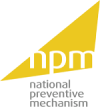NPM Scotland Subgroup responds to Ministerial Statement on Prison Population
The NPM Scotland Subgroup has been deeply concerned with the rising prison population and overcrowded prisons in Scotland for many years. Prison overpopulation puts stress on all systems within prisons, from rehabilitation to healthcare to mental health care, putting the safety of both staff and prisoners at ever-increasing risk.
The collective effects of overcrowded prison environments create a significant risk that the threshold for ill-treatment will be met. This is of utmost concern to the UK NPM, as it is our mandate to work to prevent torture and ill-treatment of people deprived of their liberty.
When prisons are overcrowded, human rights standards are at risk of being compromised. For example, we know that many prisoners are being kept two to a cell in cells designed for only one person, which raises concerns of contravention of the Committee for the Prevention of Torture’s standards on cell size, which require that cells be at least 8m2 to be suitable to hold prisoners, not including a partitioned sanitary facility.[1]
The steps announced by the Cabinet Secretary for Justice are to be welcomed but are overdue.
NPM Scotland Subgroup Chair Jim Farish said:
“Whilst we are encouraged to see that meaningful action is being proposed to reduce prison overcrowding, we are greatly concerned that prisons had to reach a crisis state before action was taken.
The Scottish Government have been repeatedly warned over a considerable period of time that they did not have a grip on Scotland’s prison population. While we heard three actions proposed by the Cabinet Secretary aimed at reducing the prison population to a level that is manageable within the current prison estate, we note a continued lack of a clear plan by the Scottish Government to address the underlying causes of a growing prison population.
We would also express our concerns about the capacity for effective release planning for prisoners who will be released under these proposals. Without sufficient long-term planning and serious action, we fear this issue is simply being kicked down the road.
We are pleased to note that the Cabinet Secretary made comment that the potential impact on victims was a factor to be considered in the delivery of these proposals.”
Please contact UKNPM@hmiprisons.gov.uk with any queries.
Notes to Editors:
- The Ministerial Statement can be viewed on the Scottish Parliament YouTube channel.
- The NPM was established in March 2009 under the Optional Protocol to the Convention against Torture and other Cruel, Inhuman or Degrading Treatment or Punishment (OPCAT). A UN treaty, OPCAT was ratified by the UK in 2003. OPCAT requires states to have in place a ‘national preventive mechanism’ to visit all places of detention and monitor the treatment of and conditions for people deprived of their liberty, as it Is recognised that they are particularly vulnerable to ill-treatment.
- The 21 bodies who make up the NPM are:
Scotland
Care Inspectorate
His Majesty’s Inspectorate of Constabulary in Scotland
His Majesty’s Inspectorate of Prisons for Scotland
Independent Custody Visiting Scotland
Mental Welfare Commission for Scotland
Scottish Human Rights Commission
England and Wales
Care Inspectorate Wales
Care Quality Commission
The Children’s Commissioner for England
His Majesty’s Inspectorate of Prisons
His Majesty’s Inspectorate of Constabulary and Fire & Rescue Services
Healthcare Inspectorate Wales
Independent Monitoring Boards
Independent Custody Visiting Association
Lay Observers
Ofsted (Office for Standards in Education, Children’s Service and Skills)
Northern Ireland
Criminal Justice Inspection Northern Ireland
Independent Monitoring Boards (Northern Ireland)
Northern Ireland Policing Board Independent Custody Visiting Scheme
The Regulation and Quality Improvement Authority
United Kingdom
Independent Reviewer of Terrorism Legislation
4. The NPM Scotland Subgroup, which coordinates joint work on issues relating to deprivation of liberty in Scotland, consists of all the NPM members in Scotland.
[1] CPT Standards: Living space per prisoner in prison establishments
